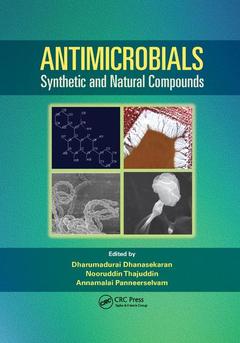Antimicrobials Synthetic and Natural Compounds
Coordonnateurs : Dhanasekaran Dharumadurai, Thajuddin Nooruddin, Panneerselvam A.

Antimicrobials: Synthetic and Natural Compounds summarizes the latest research regarding the possibilities of the most important natural antimicrobial compounds derived from various plant sources containing a wide variety of secondary metabolites. With collected contributions from international subject experts, it focuses primarily on natural products as a source of bioactive compounds that may be active against multidrug-resistant pathogens, providing an alternative to established antibiotics in controlling infectious diseases.
Covering a wide range of marine, microbial, and plant-origin antimicrobials, the book examines the usefulness of plant products containing antimicrobial molecules against bacteria, fungi, protozoa, and viruses. It also reports on unusual sources of antimicrobials such as animal fecal actinomycetes, actinobacteria, and cyanobacteria and discusses synthetic chemical compounds and biogenic nanoparticles.
The number of drug-resistant bacteria is increasing, posing a major problem to modern medicine. This book explores an important topic: finding and applying alternative means of pathogenic control and treatment via natural sources. It is an important source of information for microbiologists, biotechnologists, biochemists, pharmacologists, botanists, marine biologists, and others involved in research on natural and synthetic antimicrobial compounds. It is also a useful resource for scholars, scientists, academics, and students in various science disciplines.
Antibiotics: From Discovery to Journey. BROAD SPECTRUM ANTIMICROBIAL COMPOUNDS FROM MICROORGANISMS. Antimicrobial Potential of Marine Actinobacteria: A Review. Antimicrobial Compounds from Microorganisms: Production, Characterization, and Applications. Animal Fecal Actinomycetes: A New Source for the Discovery of Drug Leads. Potentially Novel Actinobacteria-Derived Antibiotics from Unique Microenvironments. Antimicrobial Agents from Actinomycetes: Chemistry and Applications. Actinobacteria: A Predominant Source of Antimicrobial Compounds. Novel Antimicrobial and Anticancer Drugs from Bacteria. Bacteriocin: A Natural Alternative to Synthetic Antibacterial Antibiotics. Protease Inhibitors from Marine Organisms. Ganoderma: A Bioresource of Antimicrobials. Marine Cyanobacteria: A Prolific Source of Antimicrobial Natural Products. Antimicrobial and Natural Compounds from Edible Mushrooms. Aspergillosis and Its Resistance: Marine Natural Products as Future Treatment. BROAD SPECTRUM ANTIMICROBIAL COMPOUNDS FROM ANIMALS. Secondary Metabolites from Microorganisms Isolated from Marine Sponges from 2000 to 2012. BROAD SPECTRUM ANTIMICROBIAL COMPOUNDS FROM PLANTS AND RHIZOSPHERE MICROORGANISMS. Antimicrobial Compounds and Their Chemical Entities on Therapeutic Herbals for Agricultural and Medical Applications. Role of Antimicrobial Compounds from Trichoderma spp. in Plant Disease Management. Antimicrobial Compounds from Rhizosphere Bacteria and Their Role in Plant Disease Management. SYNTHETIC CHEMICAL COMPOUNDS AS BROAD SPECTRUM ANTIMICROBIALS. Microbe-Mediated Synthesis of Silver Nanoparticles: A New Drug of Choice against Pathogenic Microorganisms. Nanomaterials: Source of Antimicrobial Products. Platinum-Based Anticancer Therapeutics and Their Mechanistic Aspects: An Overview. NARROW-SPECTRUM ANTIMICROBIALS. Marine Actinobacteria as Potential Drug Storehouses: A Future Perspective on Antituberculosis Compounds. Antiprotozo
Dharumadurai Dhanasekaran, PhD, is an Assistant Professor at Bharathidasan University, Tiruchirapalli, Tamil Nadu, India. He is experienced in actinobacteriology and mycology, with his current research focusing on actinobacteria, microalgae, fungi, and mushrooms for animal and human health improvement. He has deposited approximately 54 nucleotide sequences in GenBank, published 77 research and review articles and one book, and organized several national-level symposia, conferences, and workshops. He is a life member of the Mycological Society of India and the National Academy of Biological Sciences, is an editorial board member of national and international journals, and is a board of studies member in microbiology.
Nooruddin Thajuddin, PhD, is the Dean of the Faculty of Science, Engineering and Technology and the Head of the Department of Microbiology of the School of Life Sciences at Bharathidasan University, Tiruchirapalli, Tamil Nadu, India. He has vast experience in microbial taxonomy, isolation, cultivation, harvesting, and extraction of valuable products and is an expert in employing molecular tools in the identification and phylogeny of various microorganisms and bioremediation of effluents and bioenergy from microalgae and cyanobacteria. He has deposited about 475 nucleotide sequences in GenBank; has published 220 research and review articles and three books; has developed germplasm of cyanobacteria, microalgae, bacteria, actinobacteria, and fungi in his laboratory; and has organized several national-level symposia, workshops, refresher courses, and DST-INSPIRE programs. He is a life member of various academic bodies and an editorial board member of national and international journals.
Annamalai Panneerselvam, PhD, is an Associate Professor and the Head of the Department of Botany and Microbiology at AVVM Sri Pushpam College, Poondi, Tamil Nadu, India. He has more than 32 years of experience in teaching and
Date de parution : 09-2019
17.8x25.4 cm
Date de parution : 11-2015
17.8x25.4 cm
Thèmes d’Antimicrobials :
Mots-clés :
Marine Actinobacteria; Tamil Nadu; Marine Actinomycete; Secondary Metabolites; Antimicrobial Compounds; Vancomycin Resistant Enterococci; Antifungal Activity; Bioactive Compounds; Ganoderic Acids; Silver Nanoparticles; Plant Disease Management; Fruiting Body; HSV-2; Nonribosomal Peptide Synthetase; Biocontrol Agents; Nuclear Magnetic Resonance; Streptomyces Species; Marine Microorganisms; De Hoog; Streptomyces Fradiae; Endophytic Actinomycetes; High Throughput Screening; Antimicrobial Metabolites; Secondary Metabolic Chemical Compounds; Ce Ae



